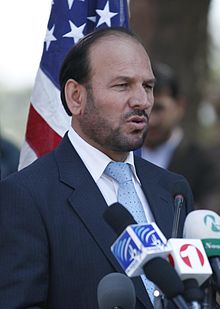| This article needs to be updated. The reason given is: He is probably not still the Governor of a province after the Taliban takeover of 2021. Please help update this article to reflect recent events or newly available information. (June 2023) |
| Abdul Basir Salangi عبدالبصیر سالنگی | |
|---|---|
 Abdul Basir Salangi speaking in 2011 Abdul Basir Salangi speaking in 2011 | |
| Governor of Farah | |
| Incumbent | |
| Assumed office January 28, 2018 | |
| President | Ashraf Ghani |
| Preceded by | Muhammad Arif Shah Jahan |
| Governor of Parwan | |
| In office 6 May 2009 – 8 June 2015 | |
| Succeeded by | Mohammad Asim Asim |
| Personal details | |
| Born | 1962 (age 61–62) Salang, Parwan Province, Afghanistan |
| Political party | Jamiat-e Islami |
| Ethnicity | Tajik |
Abdul Basir Salangi or Abdul Baseer Salangi, born on 8 August 1962 in Parwan, is the ethnic Tajik who has been a former Governor of Farah province in Afghanistan, and a commander in the Afghan Civil War, aligned with Jamiat-e Islami and Ahmad Shah Massoud. Additionally, he was chief of Kabul after the 2001 fall of the Taliban regime, until he was replaced by General Baba Jan after being indicted in the Shinpur scandal.
Karzai administration
Following the fall of the Taliban government in 2001, Salangi was appointed as the chief of police for Kabul. However the Afghan Independent Human Rights Commission accused him of bulldozing 300 poor houses in the Shinpur district of Kabul, to clear land for building houses for warlords. Following this Salangi was removed from his post and assigned as Police Chief of the volatile Wardak Province where he stayed until 2005. In 2008 Salangi was posted as governor of Parwan.
In 2010, as governor, he directed rescue efforts in the region after an avalanche struck the province.
Assassination attempts
Salangi has been a target of assassination attempts like many other Afghan politicians and government officials. On August 14, 2011, a team of about six suicide bombers launched a coordinated assault on the governor's palace in Charikar. Although Salangi survived the high-profile assault, 19 other people were killed in the incident. The attack began with a car bomb explosion outside the front gate of his palace followed by suicide bombers storming in and blowing themselves up in the compound. Gen. Abdul Jalil Rahimi of the Afghan National Police said he was at a meeting with Salangi, Afghan army and police officials, and at least two NATO police advisers, when the assault began. He further said that "two of the bombers were able to get into the building of the governor's house", but were killed before they could reach their main targets. The Taliban claimed responsibility for the attack.
Second Resistance
In January 2021, while addressing a memorial ceremony for the victims of the 14 January 1989 massacre in the Salang district of central Parwan Province, Salangi said that 'if the Taliban were unwilling to embrace peace, the people of Afghanistan would form a second resistance front against them'.
References
- "Abdul Basir Salangi". www.afghan-bios.info. Retrieved 2018-07-05.
- ^ More bodies recovered from Afghan avalanche. Courier Mail. February 10, 2010.
- Afghanistan doing just fine, thank you; Violence not as rampant as reported, officials say. USA Today. August 12, 2002.
- "19 dead in attack on Afghan governor's compound".
- "Salang Massacre Victims Remembered". TOLOnews. 2017-01-26. Archived from the original on 2017-01-26. Retrieved 2021-08-17.
- Tanha, Farid (2021-01-26). "'Taliban to face 2nd resistance if unwilling to make peace'". Pajhwok Afghan News. Archived from the original on 2021-01-26. Retrieved 2021-08-17.
External links
| Preceded by | Governor of Parwan Province, Afghanistan 6 May 2009–8 June 2015 |
Incumbent |
| Governors of the provinces of Afghanistan | |||||||||||||||||||||
|---|---|---|---|---|---|---|---|---|---|---|---|---|---|---|---|---|---|---|---|---|---|
| |||||||||||||||||||||
| |||||||||||||||||||||
| |||||||||||||||||||||